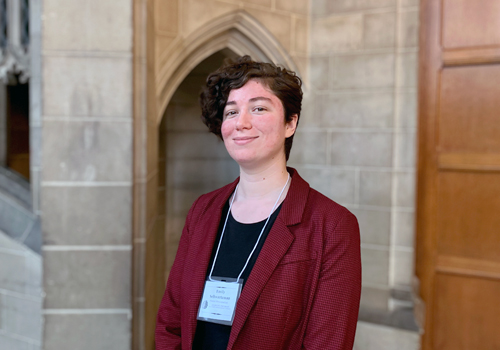Emily Schwartzman surveyed the packed room at a recent groundbreaking student-led conference on sex and gender in neuroscience and took a moment to soak in the excited buzz of researchers discussing their work.
“Seeing all the wonderful research coming from U of T, and researchers with links to U of T, really drove home that we're at the cutting edge in this area of considering sex and gender in neuroscience and mental health research,” says Schwartzman, a third-year PhD student.
A year ago, Schwartzman was part a select group of graduate students awarded extra funding to incorporate sex or gender into their brain and mental health research. The initiative is led by psychology Professor Gillian Einstein, the Wilfred and Joyce Posluns Chair in Women’s Brain Health and Aging.
“It's the first conference of this type held at the University of Toronto, and as far as I know, anywhere in the world. Arts & Science can take credit for that,” says Einstein, adjunct scientist at Women’s College Research Institute.

The conference was the latest milestone in a University-wide collaboration initiated by the Faculty of Arts & Science to help fill sex and gender gaps in research data for a range of health issues, from Alzheimer’s disease to clinical depression.
For example, two thirds of people with Alzheimer's disease are women. And yet, most studies either don't include women or don't distinguish women from men for the purposes of analyzing the data, says Einstein.
In the same way, omitting gender considerations can also skew research data because a person’s socioeconomic standing — or the stress and stigma they endure due to prejudice or stereotypes — can affect their biology, including cognition and memory.
Einstein says incorporating sex and gender considerations into research may help speed the discovery of treatments and cures for a range of health issues. It also positions students for support from funding agencies, who increasingly are insisting sex or gender considerations be included in all health research.
Schwartzman, one of the conference organizers, presented the results of her research into the impact of gender stereotypes and prejudice, including on climate change and pro-environmental behaviours.
“It's been a very productive line of research, and that's raised some new questions that we're looking into for further studies,” says Schwartzman, who earned her master of arts in psychology from U of T in 2020.
“In addition to strengthening our research, I was actually able to secure a new funding source for another line of research, specifically examining gendered social perceptions.”
Students gave talks and displayed their work on posters as part of the March 22 to 23 conference, which also featured expert panels.
“What really stood out was that here were a group of people who are interested in this idea of thinking about sex differences or gender in research work and yet they had never all come together before under this rubric,” she says.
“The poster presentations were maybe the best part because they were so diverse and yet everybody was excited to hear what other people were doing as well. That gives you a sense of the diversity of the research going on at the University of Toronto.”
Laura Gravelsins, a PhD candidate in psychology, won the poster award for her research on women who have their ovaries surgically removed for cancer prevention because they carry a specific genetic mutation that puts them at higher risk.
“We’re looking at the effects on their brain health, because the estrogens and progesterone produced by the ovaries aren't just sex hormones, they're very important for the brain as well,” says Gravelsins, who earned her master of arts in psychology from U of T in 2018.
“It was great to be able to share our work at the conference, and to discuss it with others who may be doing the same lines of research but approaching it from a little bit of a different angle than we are in our lab.”
Arts & Science also hosted a dinner for the speakers and students attended by Lynn Posluns and several family members. Posluns is the president of the Women's Brain Health Initiative, which helped create the Chair in Women’s Brain Health and Aging awarded to Einstein.
“I think the family enjoyed meeting students who were flourishing because of their donation,” says Einstein.
“They also talked about how they decide where to direct their support as a family. It was very thoughtful, and I was thrilled the students got that experience so early in their careers,” she says.

